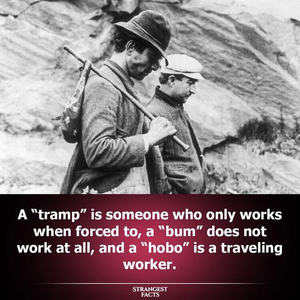
tramp (v.)
late 14c., trampen, "walk heavily, stamp," from Middle Low German trampen "to stamp," from Proto-Germanic *tremp- (source also of Danish trampe, Swedish trampa "to tramp, stamp," Gothic ana-trimpan "to press upon"), from PIE *der- (1) "to run, walk, step" (see
tread (v.)).
Intransitive sense of "walk with a heavy tread" is from late 14c. That of "sound of a heavy tread in walking" is by 1808. The sense of "excursion, journey" is by 1786 (on the tramp "going from place to place" is by 1760). Related: Tramped; tramping.
also from
late 14c.
tramp (n.)
"person who wanders about, idle vagrant, vagabond," 1660s, from
tramp (v.). The sense of "freight steamship which takes cargo wherever it can be traded" (as opposed to one running a regular line) is attested from c. 1880 (tramp steamer is by 1887). The meaning "promiscuous woman" is attested by 1922. The sense of "a long, toilsome walk" is from 1786.
also from
1660s
bum (n.1)
"buttocks," late 14c., "probably onomatopœic, to be compared with other words of similar sound and with the general sense of 'protuberance, swelling.' " [OED]
Related entries & more
bum (n.2)
"dissolute loafer, tramp," 1864, American English, from
bummer (q.v.) "loafer, idle person" (1855), which is probably from German.
Bum first appears in a German-American context, and bummer was popular during the American Civil War in the slang of the North's army (which had as many as 216,000 German immigrants in the ranks). There may also be influence or merging with
bum (n.1) "buttocks," which was applied insultingly to persons from 1530s and is in Jamieson's 1825 Scottish dictionary.
Bum's rush "forcible ejection" is recorded by 1910.
Related entries & more
bum (v.)
1863, "loaf and beg," American English, a word from the Civil War, perhaps a back-formation from
bummer "loafer," or from
bum (n.2). The meaning "feel depressed" is from 1973, perhaps from bummer in the "bad experience" sense. Related: Bummed; bumming.
Related entries & more
bum (adj.)
"of poor quality," 1859, American English, from
bum (n.2).
Bum steer in the figurative sense of "bad advice" is attested from 1901.
hobo (n.)
"a tramp," 1889, Western U.S., of unknown origin. Barnhart compares early 19c. English dialectal hawbuck "lout, clumsy fellow, country bumpkin." Or possibly from ho, boy, a workers' call on late 19c. western U.S. railroads. Facetious formation hobohemia, "community or life of hobos," is from 1923 (see
bohemian).

























































